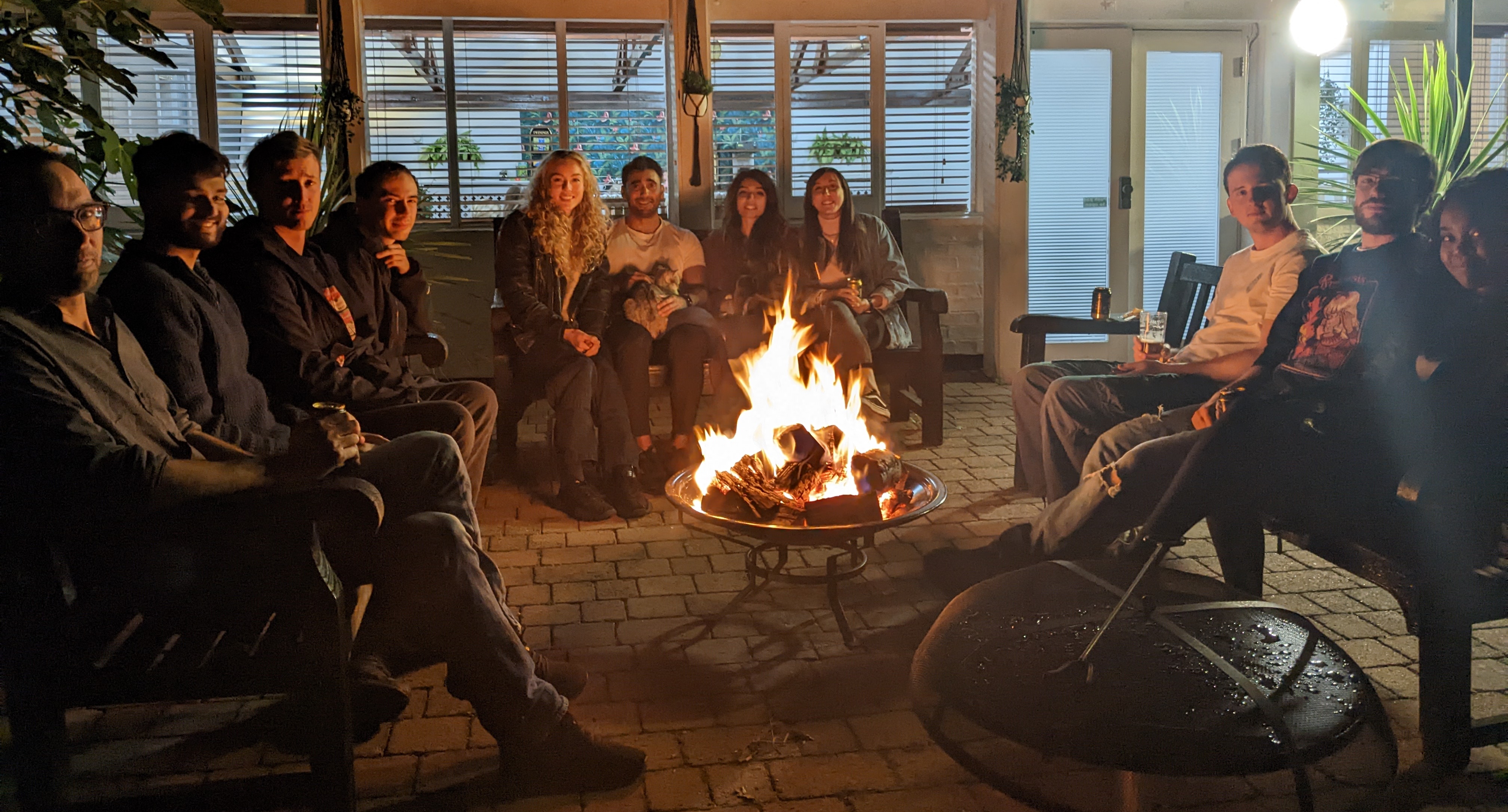
Our 2019 Student Profiles
- Matthew Allen
- Shreyas Bhatt
- William Browne
- Sara Cioccolo
- Owen Griffiths
- Michael Gruet
- Thomas Jackson
- Caroline Koch
- Jenna Robinson
- Annie Sahota
- Thomas Wells
 Name
Name
Matthew Allen
Project Title
Building de novo signalling pathways for multi-stage smart delivery systems in cancer
This project is co-sponsored by the Institute of Chemical Biology EPSRC Centre for Doctoral Training and The NIHR Imperial Biomedical Research Centre (BRC)
What were you doing before enrolling in the ICB CDT Programme?
I was an Msci student in chemistry at Imperial College London
Why did you choose to apply for your particular project?
I chose this research project due to its multidisciplinary nature and potential real world application. Enabling me to do science that could have an impact in addition to having many potential avenues to explore throughout my PhD.
What did you enjoy the most or find the most useful within the CDT programme?
Throughout the CDT programme I enjoyed the opportunities to broaden my skillset outside of the lab through the various retreats and courses. I also enjoyed the sense of community the CDT offered and nurtured through the coffee mornings and social events put on, allowing me to make connections and friends outside of my research group.
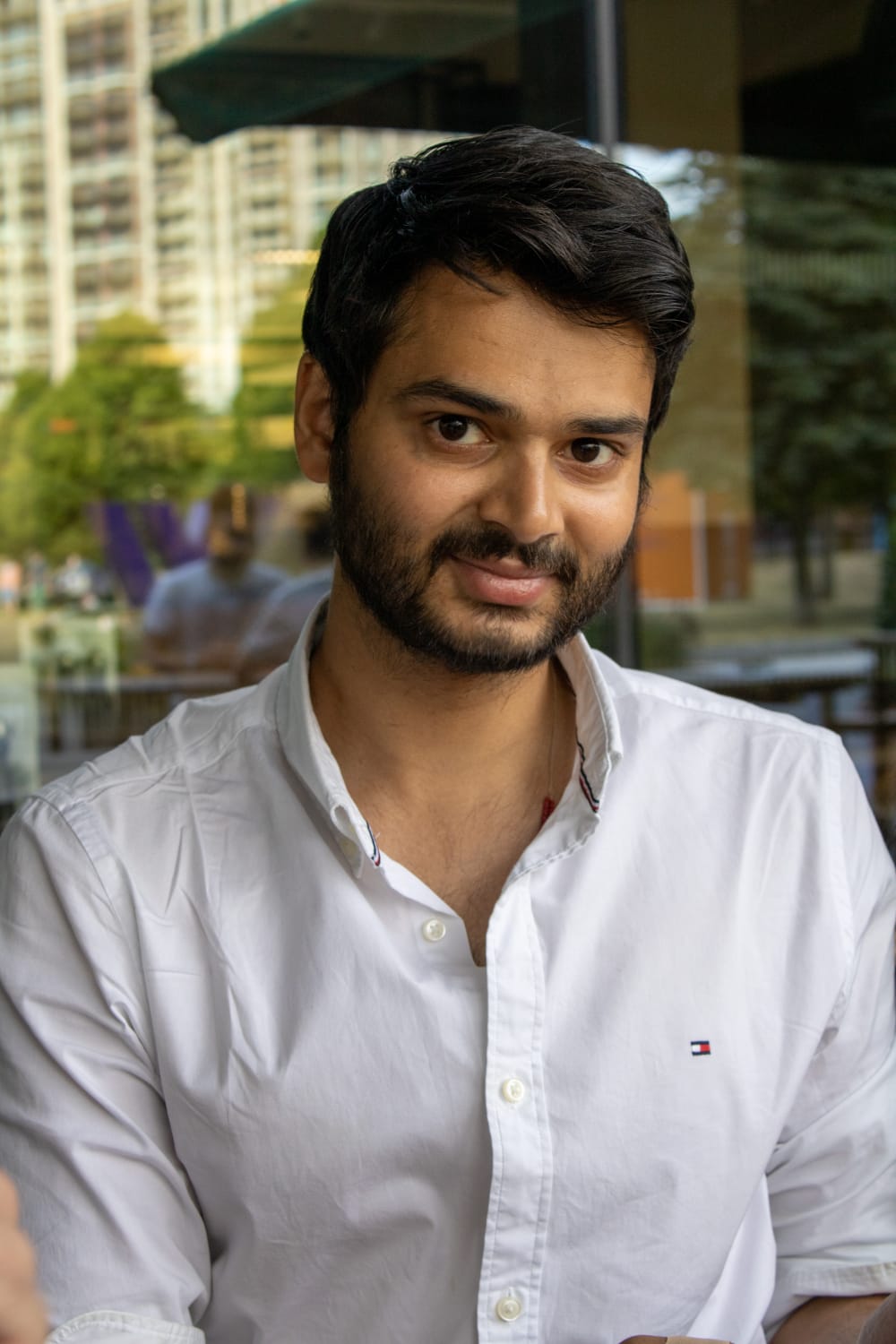 Name
Name
Shreyas Bhatt
Project Title
Gut-on-chip 4.0 – next-generation microfluidic platform for microbiome research.
What were you doing before enrolling in the ICB CDT Programme?
I was working as a freelance software engineer and systems engineer after gaining my BSc in Biomedical science and MSc in computer science from the University of Bath. I have previously also worked at the University of Leicester as a Research assistant.
Why did you choose to apply for your particular project?
My previous work as a research assistant fuelled me to choose my project because I wanted to apply the interdisciplinary skills I had picked up from my previous degrees, and few projects allow such freedom as ICB CDT courses. I wanted to learn more about Natural sciences and Engineering and work with surgeons and clinicians on obtaining patient intestinal tissues for research on IBD and colon cancers, learning bioengineering to remove the need for animal testing for novel drugs. Working with Professors Gary Frost and Aylin Hanyaloglu from the Medicine Dapartment and Professors Joshua Edel and Ed Tate from the Chemistry Department.
What are you looking forward to the most within the CDT programme?
Collaborating with scientists of all different fields, which I am not familiar with, and increasing my intrapersonal skills by extra curricular activities, which is more interesting than sticking to a linear PhD, such as learning business through the micro-MBA and the additional funding grants that can help grow our ideas into a full business. Being at the crossroads of a new way of scientific research that brings together previously mutually exclusive sciences. I have the freedom to develop my own methods.
Please tell us a fun fact about yourself!
I presented a talk for 15 minutes on shoelaces to practice for the CDT Den 2023 and came first place!
 Name
Name
William Browne
Project Title
Combining multiple bullets against a sweet target - Fragment-based drug discovery to tackle cancer glycosylation.
This project is co-sponsored by the Institute of Chemical Biology EPSRC Centre for Doctoral Training and GSK
What were you doing before enrolling in the ICB CDT Programme?
Prior to my PhD I had first completed an MChem degree at the University of Southampton. I then spent a year working in a south London school chemistry department.
Why did you choose to apply for your particular project?
I chose my current PhD project for several reasons. Firstly, throughout my Chemistry degree I had always been more interested in organic and bioorganic chemistry. A drug discovery project thus appealed to me due to their inherent interdisciplinary nature and centring at the chemistry/biology interface. The project was also based in a glycobiology group, which would allow me to work and study within a rapidly expanding scientific field. Finally, this project was also the only one to be based at the Francis Crick institute and in collaboration with GSK, giving me access to expertise from three institutions.
What did you enjoy the most or find the most useful within the CDT programme?
For me, I most enjoyed the science communication sessions. Some of these included delivering pitches of our project on camera and being interviewed by peers. Also, as someone who enjoys podcasts, the opportunity to record a science podcast/radio show was a lot of fun. The networking events that allowed me to get to know my fellow course mates were also a highlight.
Please tell us a fun fact about yourself!
Perhaps more embarrassing than fun, but the earliest memory I have of winning anything was a spontaneous hula hooping competition when I was about 8.
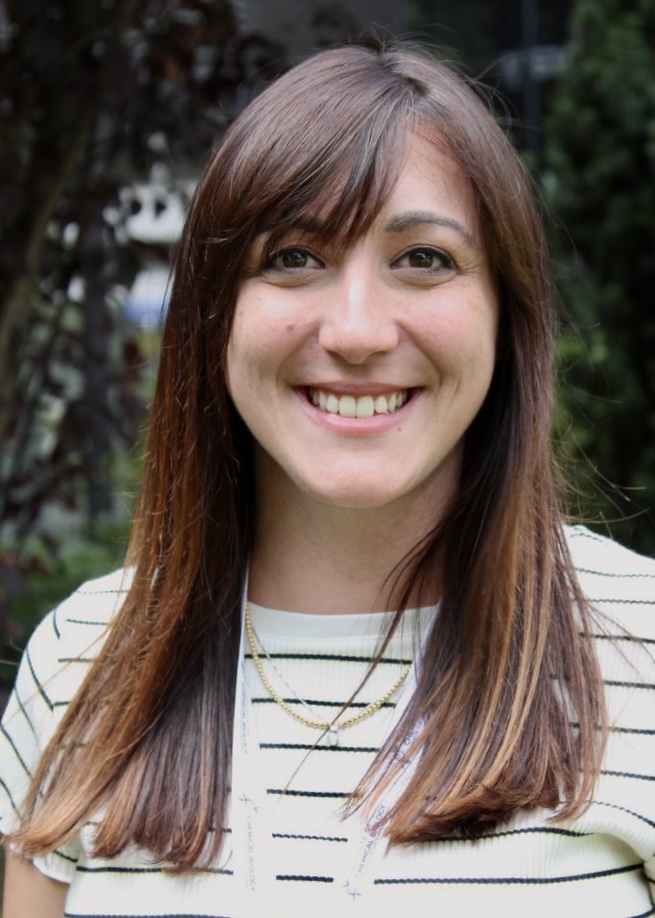 Name
Name
Sara Cioccolo
Project Title
Molecular Dynamics simulations and membrane biophysics as novel approach for the characterisation of Mycobacterium smegmatis and tuberculosis MmpL3
This project is co-sponsored by the Institute of Chemical Biology EPSRC Centre for Doctoral Training and The NIHR Imperial Biomedical Research Centre (BRC)
What were you doing before enrolling in the ICB CDT Programme?
I was working as a molecular biologist and in vitro assay scientist in a biotech in Cambridge developing monoclonal antibodies as novel therapeutics for a range of different medical conditions, such as cancer, autoimmune diseases and infections.
Why did you choose to apply for your particular project?
I came across Molecular Dynamics simulations during my work experience in the Infectious disease and Vaccines group. I was fascinated at how computational and experimental approaches can complement each other in pursuit of a deeper understanding of membrane protein structures that can lead to the development of novel drug candidates. The multidisciplinary nature of my project would allow me to learn computational skills while broadening my experience in experimental techniques.
What did you enjoy the most or find the most useful within the CDT programme?
It surely helped me a lot to have a cohort of people to rely on outside of my own lab group and I really liked spending time with them at bespoke events and retreats organised within the CDT programme. I will definitely treasure the personal relationships that I established within the cohort, some of which evolved into awesome friendships.
Please tell us a fun fact about yourself!
I am literally obsessed with tennis, I like playing it during the weekend but also watching practically all tournaments while supporting the Italian players!
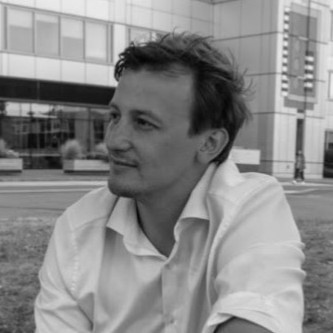 Name
Name
Owen Griffiths
Project Title
Development of a bedside diagnostic tool to determine low levels of free haemoglobin in whole blood
This project is co-sponsored by the Institute of Chemical Biology EPSRC Centre for Doctoral Training and Roche
What were you doing before enrolling in the ICB CDT Programme?
I graduated from Cardiff University with a BSc in Biochemistry in 2014, and went on to work as an R&D scientist in industry developing blood glucose biosensors before joining the ICB CDT in October 2019. Prior to my PhD I was working at Abbott diabetes care developing blood glucose sensors.
Why did you choose to apply for your particular project?
During my PhD, in collaboration with Roche, I was working in Tony Cass's lab developing electrochemical biosensors for detection of haemoglobin in Urine. During my PhD I founded OG Carbon which sells high quality carbon electrodes.
What have been your next steps after finishing your PhD labwork?
As well as running OG Carbon, I am also currently working at Early Health developing at home urine sensors for a range of medical conditions and wellness analytes.
Please tell us a fun fact about yourself!
My company Wearitech came first place in the ICB CDT Den 2023 with fellow ICB CDT students Shreyas Bhatt and Tom Kitto.
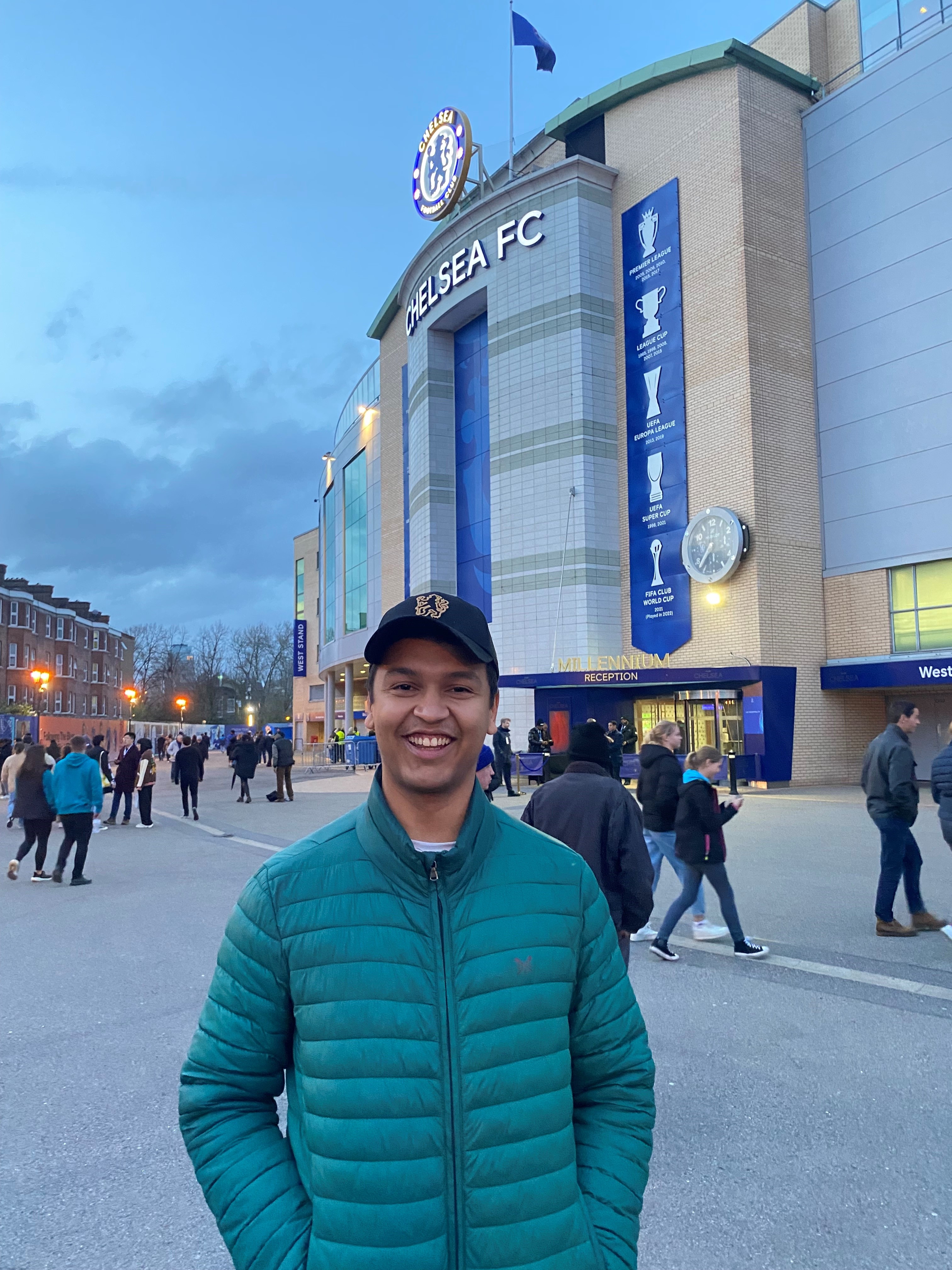 Name
Name
Michael Gruet
Project title
Targeting NAD+ metabolism in ovarian cancer
This project is jointly funded by the CRUK Imperial Centre and Institute of Chemical Biology EPSRC Centre for Doctoral Training as a 4 year PhD
What were you doing before enrolling in the ICB CDT Programme?
I was a Laboratory Research Scientist at the Francis Crick Institute after completing the MRes in Cancer Biology at Imperial.
Why did you choose to apply for your particular project?
Because I was interested in undertaking a translational research project that would enable me to learn a broad range of new skills.
What did you enjoy the most or find the most useful within the CDT programme?
I found the EVOLVE Placement programme useful. It allowed me to gain experience working in industry, and this has helped me better understand what career opportunities I could have after a PhD.
What have been your next steps after finishing your PhD labwork?
I am currently a Postdoctoral Researcher at the ICR.
Please tell us a fun fact about yourself!
I’m very good at randomly bumping into members of the Chelsea FC men’s team!
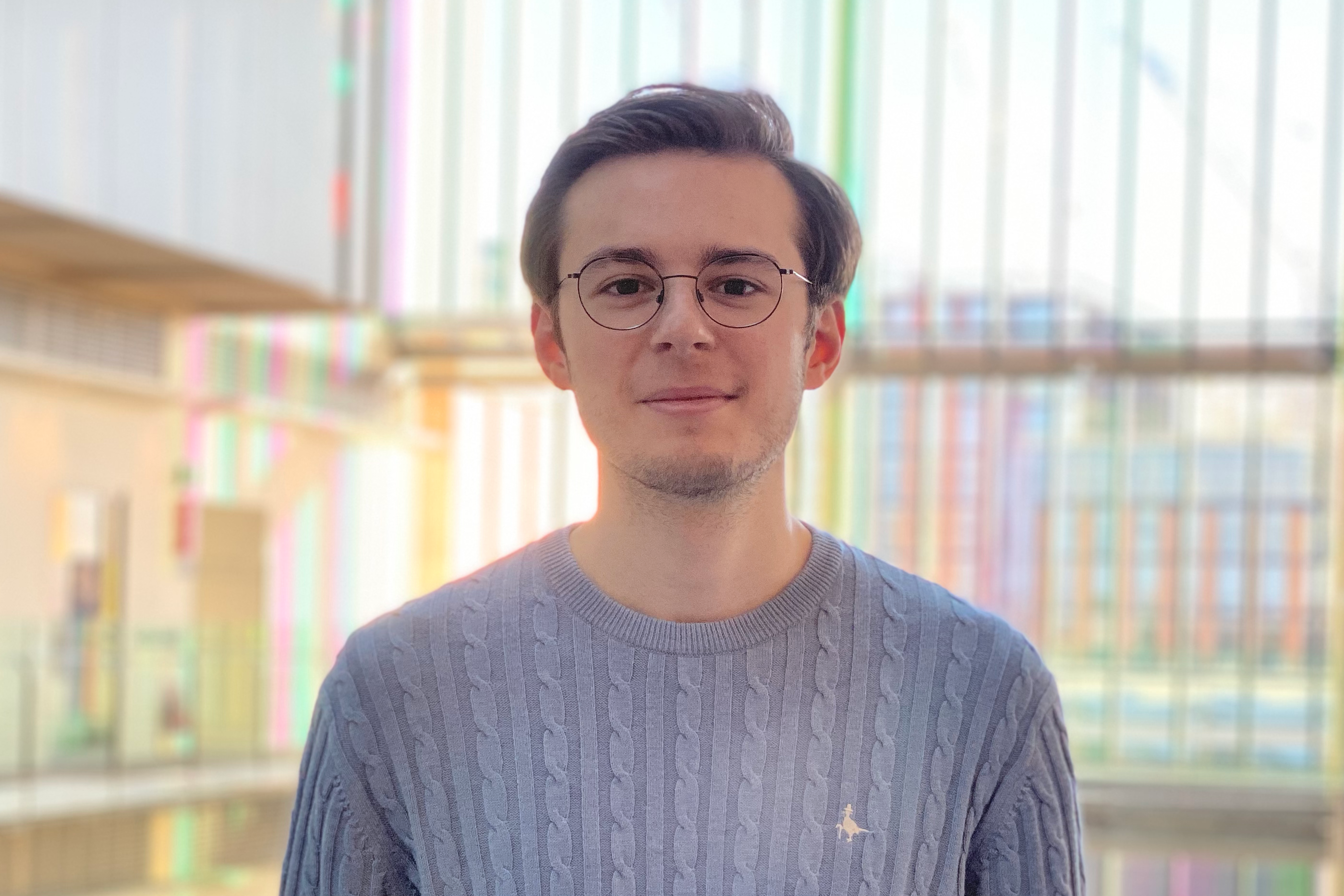 Name
Name
Thomas Jackson
Project Title
PhotoRaPID: Development of a trillion-member discovery platform to identify de novo light-responsive cyclic peptides
What were you doing before enrolling in the ICB CDT Programme?
Prior to the PhD, I undertook a Master of Research (MRes), in the Department of Chemistry at Imperial, under the supervision of Prof. Ed Tate. I wanted to undertake this this masters project to see if academic research was a suitable route for my future.
Why did you choose to apply for your particular project?
I chose this project as I was very interested in multidisciplinary research. Coming from a synthetic chemistry background, I wanted to broaden the range of techniques I was exposed. I also wanted to carry through the research from initial design, through to discovery and testing. I have thoroughly enjoyed my PhD and thanks to the multiple groups I was part of, alongside the CDT I have developed a wide scientific network and learnt a broad range of scientific and transferable soft skills.
What did you enjoy the most or find the most useful within the CDT programme?
I found the support community, allowing me to obtain a wider research network across Imperial. I also found the seminars providing exposure to other career opportunities beyond academia very useful. They provided insight to the use and value of this multidisciplinary PhD in other diverse job sectors.
What have been your next steps after finishing your PhD labwork?
I am currently undertaking a post-doctoral role with my PhD supervisors to further the work of my PhD. Following this I aim to do one further post-doctoral research role possibly abroad to experience this and/or to move away from academia in the future, but still in a field related to science!
Please tell us a fun fact about yourself!
I started doing Hot Yoga during my thesis write up. Moving around my mat really helped keep me motivated during this period. It is something that I have continued to do post-PhD, and it’s something which I find super enjoyable to keep me motivated.
 Name
Name
Caroline Koch
Project Title
Novel screening platform for highly multiplexed biomarker analysis using nanopores
This project is co-sponsored by the Institute of Chemical Biology EPSRC Centre for Doctoral Training and Oxford Nanopore Technologies
What were you doing before enrolling in the ICB CDT Programme?
Before the CDT in Chemical Biology (MRes + PhD), I did a BSc in Pharmaceutical Biotechnology (Germany and USA), followed by an internship in a consultancy firm in Frankfurt and a MSc in Biomedical Engineering at Imperial College.
Why did you choose to apply for your particular project?
I always thought that I would be a medical doctor one day. However, realised through an internship in the hospital that it is the science I liked and not necessarily the stressful day-to-day in hospitals. I also wanted to do something which can potentially help people, such as early disease detection. With a background in pharmaceutical sciences and engineering I was interested to combine these two areas in my PhD project and work on a novel way of diagnosing diseases. The strategy to achieve this did not matter to me so much, which you can read more about in my 'fun fact'. More important for my decision was the overall research aim, potential impact of the project, my direct supervisors and the group I would be working in for the next few years.
What did you enjoy the most or find the most useful within the CDT programme?
Since I recently finished my PhD, I can say what I enjoyed the most during the programme. For instance, I really liked the community aspect of the CDT programme, which enabled me to learn about other people’s research, totally unrelated to mine. I also liked the extra courses that were offered, such as the Science Communication workshops, training at Imperial College’s Advanced Hackspace, and other industry-let innovation workshops.
Please tell us a fun fact about yourself!
My project revolves around nanopores, which are tiny holes used for sequencing or detecting biomarker in diagnostics. Fun fact, at the start of my project I had no idea what nanopores were, never heard about them for that matter. I did not even have Chemistry in high school, so it was quite scary to start a PhD in a subject I was not an expert in and a research area I had never heard of. Fortunately, it all worked out for me, I finished with a PhD in the Department of Chemistry, published my research in Nature Nanotechnology, and received the EPSRC Doctoral Prize fellowship. So, I guess being an imposter and feeling lost at the start can also work in your favour!
 Name
Name
Jenna Robinson
Project Title
DNA G-quadruplex structures and cancer: studies towards a novel optical diagnostic tool
This project is co-sponsored by the Institute of Chemical Biology EPSRC Centre for Doctoral Training and The NIHR Imperial Biomedical Research Centre (BRC)
What were you doing before enrolling in the ICB CDT Programme?
I did my undergraduate in natural sciences at Cambridge where I specialised in chemistry, but then moved into the chemical biology space during my masters at UCL where I worked on peptide synthesis for drug discovery.
Why did you choose to apply for your particular project?
I knew I wanted to apply my chemistry knowledge to important biological problems such as cancer, which is what attracted me to a project based on developing new tools for cancer diagnosis. I also liked that the project had supervisors from multiple fields and would allow me to develop a diverse skill set.
What did you enjoy the most or find the most useful within the CDT programme?
I loved the interdisciplinary nature of the CDT, you get exposed to so many different research topics in chemistry, biology, physics and more. The fact that all students have multiple supervisors means you establish a great network for expanding your knowledge beyond the subject you may have initially specialised in.
What have been your next steps after finishing your PhD labwork?
I’m starting a post-doc at Harvard where I’ll be working at the Dana-Farber Cancer Institute researching paediatric brain cancers.
Please tell us a fun fact about yourself!
I absolutely love to dance and have spent an unfathomable number of hours learning the dance routines of almost every Beyonce music video.
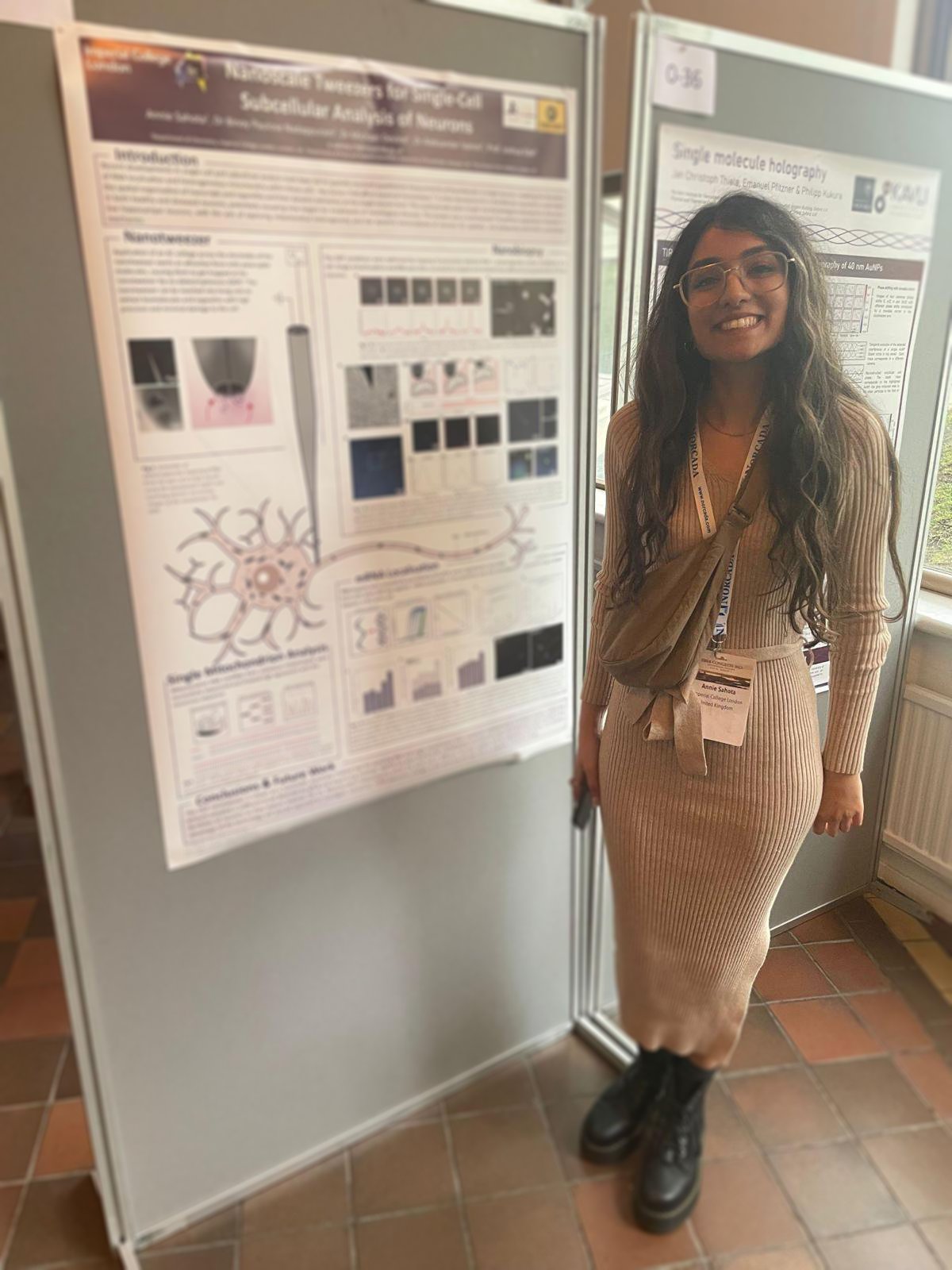 Name
Name
Annie Sahota
Project title
Nanotweezers for single-cell subcellular analysis of neurons
This project is co-sponsored by the Institute of Chemical Biology EPSRC Centre for Doctoral Training and The NIHR Imperial Biomedical Research Centre (BRC)
What were you doing before enrolling in the ICB CDT Programme?
I did an integrated master’s degree in Chemistry at the University of Sheffield. I started to transition into chemical biology during the final year of my undergraduate degree, where my research project was on the synthesis of nanovesicles for magnetic hyperthermia cancer treatment.
Why did you choose to apply for your particular project?
Having really enjoyed my initial experience of multidisciplinary research at the end of my undergraduate degree, I knew that I wanted to continue working on research that spanned multiple fields. I was also interested in work that addressed a biological problem or disease area so wanted to focus on that during my PhD. My project therefore combined my research interests with some of the skills that I had already gained during my degree, such as nanotechnology, cell culture and imaging.
What did you enjoy the most or find the most useful within the CDT programme?
Being part of a cohort meant that I made friends with others who started on the CDT at the same time as me but worked in different research groups. This, combined with the numerous courses and events that the CDT organised, gave a community feel to the programme and helped me develop some really great friendships.
Please tell us a fun fact about yourself!
I can play the saxophone.
 Name
Name
Thomas Wells
Project Title
Chemical Approaches to Improving Photosynthesis
What were you doing before enrolling in the ICB CDT Programme?
I was completing a BSc in Biochemistry at the University of York.
Why did you choose to apply for your particular project?
I enjoyed that the project was aimed at tackling a real world problem in a practical way.
What did you enjoy the most or find the most useful within the CDT programme?
I enjoyed the extra opportunities along side my research such as the retreats.
Please tell us a fun fact about yourself!
I was christened at St Pauls Cathedral.
2019 student projects

Caroline Koch
ICB CDT: Meet our students
Project Title: Next Generation Disease Screening Using Nanosensors
Caroline Koch joined the ICB CDT in October 2019 and is currently a PhD candidate at Imperial College in London. As part of her research project, she seeks to improve early detection of prostate cancer by developing a new detection strategy utilising nanopores and machine learning algorithms. Caroline holds a BSc in Pharmaceutical Biotechnology, as well as a MSc in Biomedical Engineering from Imperial College. Due to her interdisciplinary background and passion for cancer research, she’s the ideal candidate for this project. In her free time, Caroline likes to do sports like swimming and yoga, as well as spending time with her family and friends.

Owen Griffiths
ICB CDT: Meet our students
Owen joined the ICB CDT in October 2019 and is currently a PhD candidate at Imperial College in London. He graduated from Cardiff University with a BSc in Biochemistry in 2014, and went on to work as an R&D scientist in industry developing blood glucose biosensors before joining the CDT October 2019, completing his MRes in Chemical Biology in September 2020. His current research, in collaboration with Roche, is focused on developing a biosensor for quantification of free haemoglobin.

Jenna Robinson
ICB CDT: Meet our students
Jenna joined imperial in 2019 after gaining her BSc in Natural Sciences at Cambridge and studying for her MSc at UCL. In her current work, she is developing methods to study and visualise G-quadruplex DNA in relation to cancer development, where she uses bioinformatics, organic synthesis and fluorescence imaging techniques.

Thomas Wells
ICB CDT: Meet our students
Thomas Wells is a 1+3 ICB CDT student within the Barter group working on Rubisco and Carbonic Anhydrase. He graduated from the University of York in 2019 with a BSc in Biochemistry. Previous projects include work on algal proteins, synthesising LPMO mimetics and automating ADME assays.

Yu Cheng
ICB CDT: Meet our students
Yu Cheng undertook an MRes in Chemical Biology in Octovber 2019; he then joined ICB CDT in October 2021 and is currently a PhD candidate. Before joining the Membrane Biophysics Group as a junior researcher in 2019, he obtained his BSc in chemistry from Fudan University in China. He is currently working with Prof. Oscar and Dr. Laura to build an on-chip reconstitution platform.

Sara Cioccolo
ICB CDT: Meet our students
Sara joined the ICB CDT in October 2019 and is currently a PhD candidate at Imperial College in London. She comes from Italy where she graduated with first class honours from Sapienza University in Rome with a MSc in Chemistry and Pharmaceutical technology in 2014, before moving to Cambridge, UK, for an industrial internship as part of the “Leonardo Da Vinci” fellowship. She stayed in industry and worked as an R&D scientist for the following 5 years, developing a large amount of experience in the drug discovery field, which is one of her main scientific interests. She joined Imperial College London in October 2019 and is continuing her career by pursuing a PhD. Her current research, funded by EPSRC ICB CDT and co-funded by the NIHR Imperial Biomedical Research Centre, is focused on using molecular dynamics simulations and membrane biophysics to identify new therapeutics for the treatment of Tuberculosis.

Shreyas Bhatt
ICB CDT: Meet our students
Shreyas joined the ICB CDT in October 2019 and is currently a PhD candidate. He is working on producing a next generation model of the human gut. He attained his MSc in Computer science from the University of Bath and Bsc in Biomedical Science from Staffordshire University and is experienced in the enterprise IT sector. His research interests are computational biology, automation and nutrition.

Thomas Jackson
ICB CDT: Meet our students
Thomas joined the ICB CDT in October 2019 and is currently a PhD candidate at Imperial College in London and the Francis Crick Institute. He undertook his undergraduate degree (BSc Hons) in Medicinal Chemistry with Human Biology at Keele University. He subsequently obtained a Master of Research (MRes) in Drug Discovery and Development at Imperial and then joined the ICB programme as a first year PhD student. In his spare time he enjoys climbing, skating, reading fiction and visiting the many attractions London has to offer.

Annie Sahota
ICB CDT: Meet our students
Annie joined the ICB CDT in October 2019 after graduating with an MChem in Chemistry at the University of Sheffield. Her research is focused on the use of a single-cell biopsy platform for spatially-resolved mitochondrial analysis of single neurons in relation to neurodegenerative diseases and aging.

Matthew Allen
ICB CDT: Meet our students
Before commencing his PhD with the Chemical Biology CDT, Matthew completed his undergraduate studies at Imperial with a final year research project on the influence of methylation of lipid headgroups on phase behaviour. During his time as an undergraduate Matthew also undertook a summer research placement at the University of California Los Angeles where he helped develop a novel method for preparing supported lipid bilayers.
Date last reviewed: 31 January 2024
Date last updated: 31 January 2024

